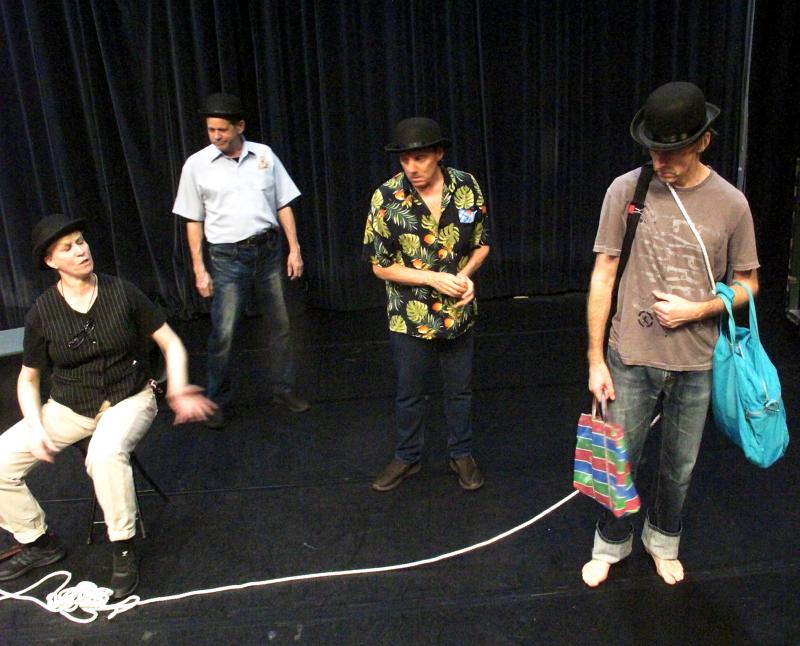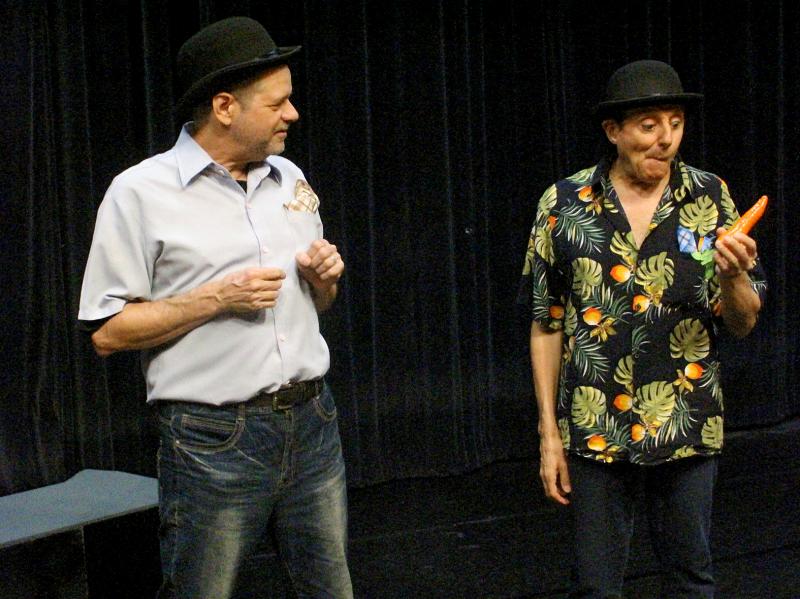Time passes slowly for the characters and audiences of Samuel Beckett’s 1953 theater of the absurd classic Waiting for Godot, and yet the play itself has proven timeless, with an ability to be performed in a wide variety of locales and languages.
Yet despite the theme and dialogue’s ability to transcend language and culture, the two-act play — and considered by many critics to be the most significant English-language play of the 20th century — has rarely been seen in Taiwan, either in English or Mandarin, since the first production in 1965.
In the past two decades there have been just a handful of shows: Stan Lai (賴聲川) directed a version at the National Theater in 2001 for his Performance Workshop (表演工作坊), while the Contemporary Legend Theatre (當代傳奇劇場) did a Beijing opera-ish version at the Metropolitan Hall in 2005.

Photo: courtesy of Phoenix Theatre
Deutsches Theater Berlin brought their production to that same hall in 2017 as part of the Taipei Arts Festival, while Coism (明日和合製作所) used the title and the idea of waiting for something to happen for their five-minute shows as part of this year’s Nuit Blanche Taipei last month.
However, the Phoenix Theatre, which was launched in 1999 and was a stalwart of local English-language productions for many years, chose the play to mark its return to the Taipei stage after a hiatus of more than a decade.
The play, which will be performed this weekend at Soochow University, has been directed by Catherine Diamond, a professor of literature and theater at university, as well as an author, flamenco dancer and director of the Phoenix Theatre and the Kinnari Ecological Theatre Project.

Photo: courtesy of Phoenix Theatre
She said that the Phoenix team thought that Waiting for Godot was an appropriate choice for this COVID-19 stricken year.
It is an “apt text to perform while human societies are in stasis, waiting for the pandemic to end and to see what the post-virus future looks like. What do we all do while waiting? We wait because we assume that this will end and is not the new normal…yet,” she wrote in the production notes.
However, it is not just COVID-19 that propelled the team. They also wanted to explore another crisis facing the world crisis, global warming and an overheated Earth.
Beckett set his play in a post-World War II northern Europe wasteland, when the institutional structures of so many countries had been devastated, but Diamond said Phoenix has transposed the action to the hot and humid climes of the global south.
Waiting for Godot is about two men, Estragon (Gogo) and Vladimir (Didi), who are waiting for a friend, Godot. They swap tales as they wait, and sleep, dream or engage with an occasional passer-by.
It can be seen as an allegory about life and death — or boredom — and while sometimes it seems endlessly bleak, there are threads of humor laced throughout.
Most of the five-member cast of Waiting for Godot are veterans of earlier Phoenix productions or those by other small troupes such as Outcast Theatre, the Taipei Alien Dramatic Society or the Butterfly Effect Theatre Company: Maurice Harrington, Paul Jackson, Sara Tarbox, Peter Balfy and Aiden Lin.
Diamond said the Phoenix production has given the play “a Taiwanese twist,” but because Beckett, when asked to describe his characters, “reputedly said: ‘The only thing I’m sure of is that they’re wearing bowlers,’ we have preserved their hats.’”
One twist that the team is divulging ahead of time is that all the actors change roles from Act I to Act II.
The play will be performed in English, with Mandarin subtitles.
There are several buses that run by Soochow University from the Shihlin MRT Station Exit 1: Nos. 557, 255, 304, 30, 18 and 620.

This month the government ordered a one-year block of Xiaohongshu (小紅書) or Rednote, a Chinese social media platform with more than 3 million users in Taiwan. The government pointed to widespread fraud activity on the platform, along with cybersecurity failures. Officials said that they had reached out to the company and asked it to change. However, they received no response. The pro-China parties, the Chinese Nationalist Party (KMT) and Taiwan People’s Party (TPP), immediately swung into action, denouncing the ban as an attack on free speech. This “free speech” claim was then echoed by the People’s Republic of China (PRC),

Exceptions to the rule are sometimes revealing. For a brief few years, there was an emerging ideological split between the Democratic Progressive Party (DPP) and Chinese Nationalist Party (KMT) that appeared to be pushing the DPP in a direction that would be considered more liberal, and the KMT more conservative. In the previous column, “The KMT-DPP’s bureaucrat-led developmental state” (Dec. 11, page 12), we examined how Taiwan’s democratic system developed, and how both the two main parties largely accepted a similar consensus on how Taiwan should be run domestically and did not split along the left-right lines more familiar in

As I finally slid into the warm embrace of the hot, clifftop pool, it was a serene moment of reflection. The sound of the river reflected off the cave walls, the white of our camping lights reflected off the dark, shimmering surface of the water, and I reflected on how fortunate I was to be here. After all, the beautiful walk through narrow canyons that had brought us here had been inaccessible for five years — and will be again soon. The day had started at the Huisun Forest Area (惠蓀林場), at the end of Nantou County Route 80, north and east

Specialty sandwiches loaded with the contents of an entire charcuterie board, overflowing with sauces, creams and all manner of creative add-ons, is perhaps one of the biggest global food trends of this year. From London to New York, lines form down the block for mortadella, burrata, pistachio and more stuffed between slices of fresh sourdough, rye or focaccia. To try the trend in Taipei, Munchies Mafia is for sure the spot — could this be the best sandwich in town? Carlos from Spain and Sergio from Mexico opened this spot just seven months ago. The two met working in the